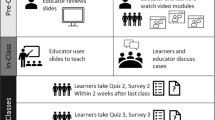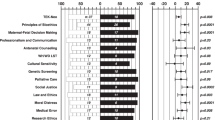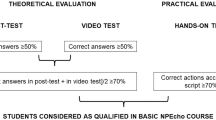Abstract
Objective
To explore interest, feasibility, perceived effectiveness, and acceptability of a standardized, national physiology curriculum for neonatal–perinatal medicine (NPM) fellows using online videos for knowledge acquisition paired with flipped classrooms (FCs) for knowledge application.
Study design
Two educational programs pairing online videos with FCs were developed and peer-reviewed. These programs were piloted at five institutions. Fellows completed surveys, and fellows and educators participated in focus groups after their FC experiences.
Results
Thirty-five fellows responded to the survey. Forty-one fellows and six educators participated in focus groups. Fellows and educators preferred online videos paired with FCs over didactic teaching and perceived them to be effective for knowledge acquisition and application.
Conclusion
Fellows and educators preferred FC learning over traditional didactics and reported that FCs facilitated creation of a learning community, fostering active learning. The favorable response toward this pilot project and the feasibility of its use supports further development of a standardized NPM physiology curriculum for fellowship training.
This is a preview of subscription content, access via your institution
Access options
Subscribe to this journal
Receive 12 print issues and online access
$259.00 per year
only $21.58 per issue
Buy this article
- Purchase on Springer Link
- Instant access to full article PDF
Prices may be subject to local taxes which are calculated during checkout



Similar content being viewed by others
References
American Board of Pediatrics. Content outline for neonatal-perinatal medicine. 2016. Available at: https://www.abp.org/sites/abp/files/pdf/neonatal_perinatal_content_outline.pdf
Rui Z, Lian-Rui X, Rong-Zheng Y, Jing Z, Xue-Hong W, Chuan Z. Friend or foe? Flipped classroom for undergraduate electrocardiogram learning: a randomized controlled study. BMC Med Educ. 2017;17:53.
Tan E, Brainard A, Larkin GL. Acceptability of the flipped classroom approach for in-house teaching in emergency medicine. Emerg Med Australas. 2015;27:453–9.
Tune JD, Sturek M, Basile DP. Flipped classroom model improves graduate student performance in cardiovascular, respiratory, and renal physiology. Adv Physiol Educ. 2013;37:316–20.
Young TP, Bailey CJ, Guptill M, Thorp AW, Thomas TL. The flipped classroom: a modality for mixed asynchronous and synchronous learning in a residency program. West J Emerg Med. 2014;15:938–44.
O’Connor EE, Fried J, McNulty N, Shah P, Hogg JP, Lewis P, et al. Flipping radiology education right side up. Acad Radiol. 2016;23:810–22.
Boysen-Osborn M, Anderson CL, Navarro R, Yanuck J, Strom S, McCoy CE, et al. Flipping the advanced cardiac life support classroom with team-based learning: comparison of cognitive testing performance for medical students at the University of California, Irvine, United States. J Educ Eval Health Prof. 2016;13:11.
Fox J, Faber D, Pikarsky S, Zhang C, Riley R, Mechaber A, et al. Development of a flipped medical school dermatology module. South Med J. 2017;110:319–24.
Shatto B, L’Ecuyer K, Quinn J. Retention of content utilizing a flipped classroom approach. Nurs Educ Perspect. 2017;38:206–8.
Moraros J, Ashrafi A, Yu S, Banow R, Schindelka B. Correction to: flipping for success: evaluating the effectiveness of a novel teaching approach in a graduate level setting. BMC Med Educ. 2017;17:203.
Moraros J, Islam A, Yu S, Banow R, Schindelka B. Flipping for success: evaluating the effectiveness of a novel teaching approach in a graduate level setting. BMC Med Educ. 2015;15:27.
Tolks D, Schafer C, Raupach T, Kruse L, Sarikas A, Gerhardt-Szep S, et al. An introduction to the inverted/flipped classroom model in education and advanced training in medicine and in the healthcare professions. GMS J Med Educ. 2016;33:Doc46.
Williams DE. The future of medical education: flipping the classroom and education technology. Ochsner J. 2016;16:14–15.
Prober CG, Khan S. Medical education reimagined: a call to action. Acad Med. 2013;88:1407–10.
Bloom BS, Engelhart MD, Furst EJ, Hill WH, Kratwohl DR. Taxonomy of educational objectives: the classification of educational goals. Handbook I, Cognitive domain. Longmans Green and Co., London, England. 1956.
Anderson LW, Kratwohl DR, Airasian PW, Cruikshank KA, Mayer RE, Pintrich PE, et al. A taxonomy for learning, teaching, and assessing: a revision of Bloom’s taxonomy of educational objectives. Pearson Education, Limited: Boston, MA; 2001.
Wittich CM, Agrawal A, Wang AT, Halvorsen AJ, Mandrekar JN, Chaudhry S, et al. Flipped classrooms in graduate medical education: a national survey of residency program directors. Acad Med. 2018;93:471–7.
Schneider J, O'Hara K, Munro I. Using continuing professional development with portfolio in a pharmaceutics course. Pharmacy (Basel, Switzerland). 2016;4:E36
Jensen JL, Kummer TA, d M Godoy PD. Improvements from a flipped classroom may simply be the fruits of active learning. CBE Life Sci Educ. 2015;14:ar5.
Harris PA, Taylor R, Thielke R, Payne J, Gonzalez N, Conde JG. Research electronic data capture (REDCap)--a metadata-driven methodology and workflow process for providing translational research informatics support. J Biomed Inform. 2009;42:377–81.
Accreditation Council for Graduate Medical Education. ACGME common program requirements. 2017. Available at http://www.acgme.org/Portals/0/PFAssets/ProgramRequirements/CPRs_2017-07-01.pdf.
Moffett J. Twelve tips for “flipping” the classroom. Med Teach. 2015;37:331–6.
Charmaz K. Teaching theory construction with initial grounded theory tools: a reflection on lessons and learning. Qual Health Res. 2015;25:1610–22.
Mahan JD, Clinchot D. Why medical education is being (inexorably) re-imagined and re-designed. Curr Probl Pediatr Adolesc Health Care. 2014;44:137–40.
Nasca TJ, Philibert I, Brigham T, Flynn TC. The next GME accreditation system - rationale and benefits. N Engl J Med. 2012;366:1051–6.
Lai CJ, Aagaard E, Brandenburg S, Nadkarni M, Wei HG, Baron R. Brief report: Multiprogram evaluation of reading habits of primary care internal medicine residents on ambulatory rotations. J Gen Intern Med. 2006;21:486–9.
Nothnagle M, Anandarajah G, Goldman RE, Reis S. Struggling to be self-directed: residents’ paradoxical beliefs about learning. Acad Med. 2011;86:1539–44.
Bolster L, Rourke L. The effect of restricting residents’ duty hours on patient safety, resident well-being, and resident education: an updated systematic review. J Grad Med Educ. 2015;7:349–63.
Sawatsky AP, Ratelle JT, Bonnes SL, Egginton JS, Beckman TJ. A model of self-directed learning in internal medicine residency: a qualitative study using grounded theory. BMC Med Educ. 2017;17:31.
Chahla M, Eberlein M, Wright S. The effect of providing a USB syllabus on resident reading of landmark articles. Med Educ Online. 2010;15. https://doi.org/10.3402/meo.v15i0.4639.
Kerfoot BP, Fu Y, Baker H, Connelly D, Ritchey ML, Genega EM. Online spaced education generates transfer and improves long-term retention of diagnostic skills: a randomized controlled trial. J Am Coll Surg. 2010;211:331–7 e331.
Pierce R, Fox J. Vodcasts and active-learning exercises in a “flipped classroom” model of a renal pharmacotherapy module. Am J Pharm Educ. 2012;76:196.
Persky AM, McLaughlin JE. The flipped classroom - from theory to practice in health professional education. Am J Pharm Educ. 2017;81:118.
Kirkpatrick DL, Kirkpatrick JD. Evaluating training programs: the four levels, 3rd ed. Berrett-Koehler: San Francisco, CA; 2006.
Acknowledgements
The authors would like to acknowledge ONTPD and MedEd On The Go for their support of this project. We are thankful that the AAP journal NeoReviews has given us permission to use questions from their CME articles and case stems from their Index of Suspicion cases. In addition, we extend our thanks to Dara Brodsky, MD, and Camilia Martin, MD, the editors of the book Neonatology Review: Q&A 3rd edition who have provided permission to use questions from their book.
Author information
Authors and Affiliations
Corresponding author
Ethics declarations
Conflict of interest
The authors declare that they have no conflict of interest.
Rights and permissions
About this article
Cite this article
French, H., Gray, M., Gillam-Krakauer, M. et al. Flipping the classroom: a national pilot curriculum for physiology in neonatal–perinatal medicine. J Perinatol 38, 1420–1427 (2018). https://doi.org/10.1038/s41372-018-0185-9
Received:
Revised:
Accepted:
Published:
Issue Date:
DOI: https://doi.org/10.1038/s41372-018-0185-9
This article is cited by
-
Comparison of knowledge acquisition and retention following traditional didactic vs. flipped classroom education utilizing a standardized national curriculum: a randomized controlled trial
Journal of Perinatology (2022)
-
Part 6: Essentials of Neonatal–Perinatal Medicine fellowship: program administration
Journal of Perinatology (2022)
-
Essentials of neonatal-perinatal medicine fellowship: innovations in medical education
Journal of Perinatology (2022)
-
Current training in percutaneously inserted central catheter (PICC) placement and maintenance for neonatal–perinatal medicine fellows
Journal of Perinatology (2020)



